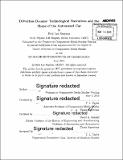Driverless dreams : technological narratives and the shape of the automated car
Author(s)
Stayton, Erik Lee
DownloadFull printable version (12.08Mb)
Alternative title
Technological narratives and the shape of the automated car
Other Contributors
Massachusetts Institute of Technology. Department of Comparative Media Studies.
Advisor
T. L. Taylor and David A. Mindell.
Terms of use
Metadata
Show full item recordAbstract
In this work Erik Stayton examines dominant and alternative paradigms of ground vehicle automation, and concludes that current and imagined automation technology is far more hybrid than is often recognized, presenting different questions about necessary or appropriate roles for human beings. Automated cars, popularly rendered as "driverless" or "self-driving" cars, are a major sector of technological development in artificial intelligence and present a variety of questions for design, policy, and the culture at large. This work addresses the dominant narratives and ideologies around self-driving vehicles and their historical antecedents, examining both the media's representation of self-driving vehicles and the sources of the idea, common both among the media and many self-driving vehicle researchers, that complete vehicle autonomy is the most valuable future vision, or even the only one worth discussing and investigating. This popular story has important social stakes (including surveillance, responsibility, and access), embedded in the technologies and fields involved in visions of full automation (machine vision, mapping, algorithmic ethics), which bear investigating for the possible futures of automation that they present. However, other paradigms for automation exist, representing lenses from literature in the fields of human supervisory control and joint-cognitive systems design. These fields-compared with that of AI-provide a very different read on what automation means and where it is headed in the future, which leads to the possibility of different futures, with different stakes and trade-offs. The work examines how automation taxonomies, such as that by the NHTSA, fail to account for these possibilities. Finally, this work examines what cultural understandings need to change to make this (cyborg) picture more broadly comprehensible, and suggests potential impacts for policy and future technological development. It argues that a broader appreciation for our hybrid engagements with machines, and recognition that automation alone does not solve any social problems, can alter public opinion and policy in productive ways, away from focus on "autonomous" robots divorced from human agency, and toward system-level joint human-machine designs that address societal needs.
Description
Thesis: S.M., Massachusetts Institute of Technology, Department of Comparative Media Studies, 2015. Cataloged from PDF version of thesis. Includes bibliographical references (pages 121-140).
Date issued
2015Department
Massachusetts Institute of Technology. Program in Comparative Media Studies/WritingPublisher
Massachusetts Institute of Technology
Keywords
Comparative Media Studies.